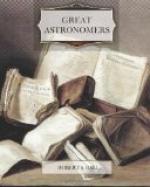The first of the great discoveries which Copernicus made relates to the rotation of the earth on its axis. That general diurnal movement, by which the stars and all other celestial bodies appear to be carried completely round the heavens once every twenty-four hours, had been accounted for by Ptolemy on the supposition that the apparent movements were the real movements. As we have already seen, Ptolemy himself felt the extraordinary difficulty involved in the supposition that so stupendous a fabric as the celestial sphere should spin in the way supposed. Such movements required that many of the stars should travel with almost inconceivable velocity. Copernicus also saw that the daily rising and setting of the heavenly bodies could be accounted for either by the supposition that the celestial sphere moved round and that the earth remained at rest, or by the supposition that the celestial sphere was at rest while the earth turned round in the opposite direction. He weighed the arguments on both sides as Ptolemy had done, and, as the result of his deliberations, Copernicus came to an opposite conclusion from Ptolemy. To Copernicus it appeared that the difficulties attending the supposition that the celestial sphere revolved, were vastly greater than those which appeared so weighty to Ptolemy as to force him to deny the earth’s rotation.
Copernicus shows clearly how the observed phenomena could be accounted for just as completely by a rotation of the earth as by a rotation of the heavens. He alludes to the fact that, to those on board a vessel which is moving through smooth water, the vessel itself appears to be at rest, while the objects on shore seem to be moving past. If, therefore, the earth were rotating uniformly, we dwellers upon the earth, oblivious of our own movement, would wrongly attribute to the stars the displacement which was actually the consequence of our own motion.
Copernicus saw the futility of the arguments by which Ptolemy had endeavoured to demonstrate that a revolution of the earth was impossible. It was plain to him that there was nothing whatever to warrant refusal to believe in the rotation of the earth. In his clear-sightedness on this matter we have specially to admire the sagacity of Copernicus as a natural philosopher. It had been urged that, if the earth moved round, its motion would not be imparted to the air, and that therefore the earth would be uninhabitable by the terrific winds which would be the result of our being carried through the air.




